Jolkona In The News
Posted on February 10, 2012.
Giving 2.0, Delta Sky Magazine, Marie Claire Magazine & More!
In case you missed it, Jolkona had a record-breaking PR streak over the last few months. First, we were mentioned in Laura Arrillaga-Andreesan’s new book, Giving 2.0, on how to transform your giving and our world. If you haven’t read it, we hightly recommend you do (and not just because we’re mentioned). We share a deep affinity with the author’s belief: “its not what how much you give, it’s how you give.” Then in January, our CEO was featured with a handful of other women who give back in Marie Claire Magazine. Next, our Co-Founder, Adnan Mahmud was featured in Delta Sky Magazine’s January issue on “Ambassadors for Good” with Bill Clinton on the cover. Lastly, Adnan and Jolkona were included in a story about Microsoft Alumni and employees who give back. To read some of the features, visit our Press page.
January 2012 Newsletter
Posted on January 23, 2012.
Welcome to the January 2012 issue of the Global Washington newsletter. If you would like to contact us directly, please email us.
IN THIS ISSUE
Note from our Executive Director
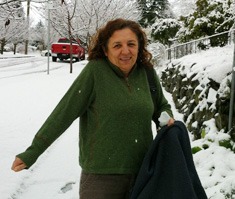
Happy Lunar New Year!
I hope you are staying warm during the cold weather and have had a restful winter so far! At Global Washington, we have had some time to reflect on our past year’s accomplishments and are excitedly planning our programming for 2012.
Last year was a big year for us! We hosted our 3rd Annual Conference, held a Summit on Global Education, and promoted Washington’s development sector through a widespread media campaign that reached over 1 million people. We plan to repeat our success with these activities in the upcoming year, and also add a variety of new programming and resources that we hope you will enjoy.
We are continually looking for ways to make Global Washington membership more valuable to you. Our newest member resource is a giving platform on our website, developed in partnership with Jolkona. Global Washington member organizations can post projects in an interactive format and connect with donors. If you are an individual looking for a worthwhile project to contribute to, or an organization hoping to reach a new audience with your message, we hope you will take some time to familiarize yourself with this resource. It can be found at http://globalwa.jolkona.org/projects/
You have probably already heard about our Careers in Global Development Center, launched last year. If you are looking for meaningful employment in 2012, I would encourage you again take a look at this resource. It is a platform for not only job postings, but also volunteer, internship, and board member opportunities.
Watch for new web resources this year, as well as events to help strengthen members and connect them to each other! We value your work and partnership and look forward to a wonderful year!
In unity,

Bookda Gheisar, Executive Director
Back to Top
Featured Organization: Mercy Corps And Google Partnership Tackles Youth Unemployment In Palestine Through The Arab Developer Network Initiative
Interview With Andy Dwonch From Mercy Corps, December 2011
NOTE: Both Andy Dwonch from Mercy Corps and Gisel Kordestani from Google, the co-architects of ADNI, will be speaking at an event sponsored by Mercy Corps on February 2nd. Details may be found here: http://www.brownpapertickets.com/event/218608
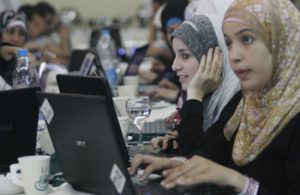 In Gaza, 53% of youth, aged between 15 and 29, are struggling to find a job. With 41% of the Palestinian population under 15, unemployment is a growing cause for concern. Through the implementation of a new program, the Arab Developer Initiative (ADNI), Mercy Corps and Google hope to create hundreds of jobs in the local IT industry in the next two years.
In Gaza, 53% of youth, aged between 15 and 29, are struggling to find a job. With 41% of the Palestinian population under 15, unemployment is a growing cause for concern. Through the implementation of a new program, the Arab Developer Initiative (ADNI), Mercy Corps and Google hope to create hundreds of jobs in the local IT industry in the next two years.
This recent partnership aims to stimulate the tech entrepreneurial community in the West Bank and Gaza as a way to generate employment and income for young people. “Movement restrictions and import/export limitations stifle the new generation from gaining employment in traditional industries,” said Andy Dwonch, Director of Social Innovation at Mercy Corps. “Meanwhile, the population is highly educated, tech-savvy, and interested in what is going on in the rest of the world. We believe they can be an effective engine for creating valuable, locally relevant, online content including web and mobile applications for regional and even global consumers.”
Origin of the Partnership
Mercy Corps has been working in Palestine since the mid-1980s, providing humanitarian relief to families in need, short-term cash-for-work income, and psychosocial support to thousands of children. In addition, Mercy Corps has been running an extensive youth leadership program, and in the last four years started to bolster the information and communication technology (ICT) industry in order to create more economic opportunities for youth.
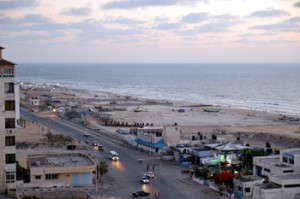 The youth leadership program in Gaza, iYouth, connects young people with their peers across the Middle East, Africa, Asia, the U.S. and Europe through a larger Mercy Corps network, The Global Citizen Corps. These networks of tech-savvy young people have made it easier to organize training events around the ICT sector. In addition, Mercy Corps’ efforts to help facilitate Palestinian IT outsourcing provided the initial foundation for conversations with Google on how best to create new jobs and generate income for young people through this sector.
The youth leadership program in Gaza, iYouth, connects young people with their peers across the Middle East, Africa, Asia, the U.S. and Europe through a larger Mercy Corps network, The Global Citizen Corps. These networks of tech-savvy young people have made it easier to organize training events around the ICT sector. In addition, Mercy Corps’ efforts to help facilitate Palestinian IT outsourcing provided the initial foundation for conversations with Google on how best to create new jobs and generate income for young people through this sector.
One of the driving forces behind ADNI is a very real market gap in the developing world. “In my initial conversations with Google, I often heard them cite the statistic that 5% of Internet users are native Arabic speakers, whereas less than 1% of the content online is in Arabic,” said Dwonch. In addition, across the rest of the developing world, there is a general lack of local language and location based content1 “This market gap needs to be filled by somebody, and who better than the vast numbers of unemployed and well-educated youth living in this region,” said Dwonch.
The number of people seeking local content online through their phones is increasing in Western countries, but access to this type of information – from emergency care services to local business offerings – is still missing in much of the developing world. “There is an opportunity for many people to start generating and curating this kind of content,” said Dwonch. “This is where we can help put people to work.”
The intersection between Google’s long-term interest in seeing more local content created in the developing world, combined with Mercy Corps’ desire to provide better avenues for access to information and to create employment opportunities for youth, helped solidify a vision for this partnership.
About the Arab Developer Network Initiative (ADNI)
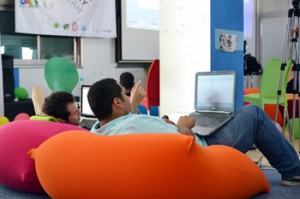 Mercy Corps obtained a two-year grant agreement from Google.org, matched by funds from the Source of Hope Foundation, to launch ADNI. The initiative provides young software developers and would-be entrepreneurs with an orientation toward market opportunities in the technology sector, by bringing together computer engineers, business people from Google and other multi-national companies to host trainings, share technology and business know-how, and help accelerate new ideas. In addition, seed funding will be made available to the most promising new start-ups in the region, as well as mentors and additional training, as needed.
Mercy Corps obtained a two-year grant agreement from Google.org, matched by funds from the Source of Hope Foundation, to launch ADNI. The initiative provides young software developers and would-be entrepreneurs with an orientation toward market opportunities in the technology sector, by bringing together computer engineers, business people from Google and other multi-national companies to host trainings, share technology and business know-how, and help accelerate new ideas. In addition, seed funding will be made available to the most promising new start-ups in the region, as well as mentors and additional training, as needed.
To make this unique alliance work, Mercy Corps and Google have defined distinct roles and responsibilities. In a nutshell, Google provides technical expertise and mentoring support, while Mercy Corps takes on the role of project manager — facilitating the ongoing program, negotiating relationships between stakeholders, and securing commitments from additional companies, donors and social investors who want to be involved.
In addition, Mercy Corps, Google and other private investors are in the process of establishing a seed fund, capitalized initially at $500,000, to support some of the most promising startup companies to come out of this effort. Initial seed stage equity investments likely will be in the range of $10,000 to $20,000. Mercy Corps hopes to attract additional investors to double the size of the fund in order to reach more startups, as well as to make second round investments.
Through the current phase of ADNI, Mercy Corps expects to train 5,000 people and help launch 10 to 15 companies a year during the first two years. Over five years, Mercy Corps estimates that thousands of jobs could be created through this initiative. Moreover, the IT sector looks particularly promising for female candidates. Since the beginning of the program, women have made up roughly 30% to 40% of participants. During the last Startup Weekend event held in December, one-third of the participants were women, twice the global average for these events.
Challenges ahead
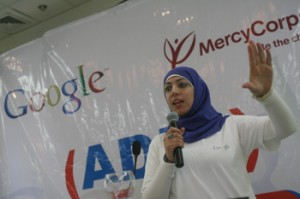 Although a promising program, all of the pieces need to come together in the right way in order for ADNI to be successful. “In developing countries, people who have access to the Internet are looking at international sites, but they’re not necessarily thinking about using their phones to look for information about their local market,” says Dwonch. “Once better local content is available, that will start to change, but it may take time to reach a critical mass.”
Although a promising program, all of the pieces need to come together in the right way in order for ADNI to be successful. “In developing countries, people who have access to the Internet are looking at international sites, but they’re not necessarily thinking about using their phones to look for information about their local market,” says Dwonch. “Once better local content is available, that will start to change, but it may take time to reach a critical mass.”
Thanks to new technologies, market opportunities, and access to financial and mentoring support, youth from Palestine will have a chance to bring their ambitious IT projects to life. “I have a lot of faith in the level of innovation in Palestine,” says Dwonch.” There’s a huge potential market out there and these young people deserve a chance to make a dent in it.”
By Sandrine Espie
1 “Local content” is defined here as any type of data, including written text, imagery, video, charts etc. that has been created for a specific geographic audience e.g. maps, on line bank, reviews on services etc.
Back to Top
Changemaker: Rashmir Balasubramaniam
Bringing Joy and Unleashing Potential
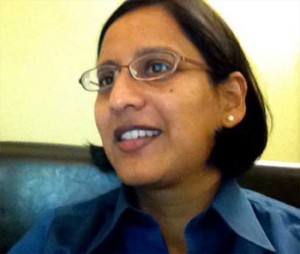 Rashmir Balasubramaniam’s office is simply a table of repurposed construction materials and a white board with so many mind maps, lines, and arrows that it resembles the first layer of a Jackson Pollock painting. Two people in this world can make sense of this white-board art: Rashmir and her assistant Ryan Ceurvorst. Working in the labyrinthine office space that is the Hub Seattle, a dedicated coworking and events center for social entrepreneurs, Rashmir is surrounded by creative energy. She is fluent in the language of connection and can take any number of seemingly disparate concepts and weave them into ideas that make light bulbs pop up above the people around her.
Rashmir Balasubramaniam’s office is simply a table of repurposed construction materials and a white board with so many mind maps, lines, and arrows that it resembles the first layer of a Jackson Pollock painting. Two people in this world can make sense of this white-board art: Rashmir and her assistant Ryan Ceurvorst. Working in the labyrinthine office space that is the Hub Seattle, a dedicated coworking and events center for social entrepreneurs, Rashmir is surrounded by creative energy. She is fluent in the language of connection and can take any number of seemingly disparate concepts and weave them into ideas that make light bulbs pop up above the people around her.
Rashmir is the CEO and Founder of Nsansa (en-SUHN-sah), a new type of consulting firm that works with individuals, organizations and groups to unleash creative, entrepreneurial and servant leadership potential. In essence, they help mission-driven people and organizations bridge the gap between where they are and where they want to be, and do so joyfully. Nsansa, in fact, means ‘joy’ in Bemba, one of the major African languages of Zambia.
Nsansa is also the name of the elementary school Rashmir attended in Ndola, Zambia, before moving to a Scottish boarding school. It was at this elementary school of Zambian, Indian, Sri Lankan, and British students that Rashmir first built her skills as peacemaker and reconciler. She was the one who could see across her classmates’ cultural divides and get them back to the important job of playing. Here too, and from her parents, she learned the importance of empathy, seeing other perspectives, and the joy of service.
With ties to Zambia, Sri Lanka, Scotland and England, Rashmir is a true third-culture person—defined by sociologist David C. Pollock as one who “has spent a significant part of [their] developmental years outside the parents’ culture…[who] builds relationships to all of the cultures, while not having full ownership in any.” Merging with that are her equally layered education and career experiences. She studied mathematics, computer science, global development and business. Her resume lists a number of well-known employers, including Ernst and Young, Planned Parenthood, and World Bank. She more recently worked at the Bill & Melinda Gates Foundation on finance, strategy, organizational development, program development/management, and collaboration. Her experience spans a multitude of issues, including investment banking, education, agriculture, malaria, reproductive health, water, sanitation and hygiene. She is an eclectic map of complimentary and contradictory experiences that merge into one dynamic entrepreneur. Her strengths lie in quickly understanding and translating various perspectives to find commonalities and opportunities for innovation and value creation.
She also has the keen ability to see trends in both the public and private sectors, identify what they can learn from one another, and strategize how they can work together. Unsurprisingly, much of her current work is focused on market-based solutions, cross-sector collaboration for social change, and social entrepreneurship.
She sees (and has experienced) how organizational structures limit potential and creative thinking. Frustrated by these restrictions, she decided to do something about it—not just for organizations, but for individuals, herself included. “I felt stuck. I had lost touch with what inspired me, what sparked my curiosity, and what gave me joy” Rashmir recalls, describing what prompted her to seek a coach to help her find her authentic path. “The power of [working with a coach] has been phenomenal,” Rashmir explains. “I’ve learned to be true to who I am instead of what others wanted me to be.”
Rashmir started connecting the dots between her vast experiences and her interest in coaching. She started teaching classes entitled “Harnessing Business and Markets to Address Poverty” and “Social Justice & Business” at both UW Foster School of Business and Bainbridge Graduate Institute. Wanting “to be an entrepreneur again and creative again,” she left the coveted halls of the Gates Foundation, set up shop at the Hub Seattle, and founded Nsansa.
“We can get so serious in the global development world that sometimes it can be counterproductive,” she explains. Asking organizations to shake off traditional structures and play more could ruffle feathers. However, as Rashmir points out, we need to welcome and sit with the complexities of our work, the systems at play, and the individual motivations and belief systems we encounter, rather than protect ourselves with assumptions and silos that only serve to entrench us. She her healthier approach promotes risk-taking, and even failing, as a strategy to build knowledge and strength. Organizations that work with her are treated to a form of coaching that encourages experimenting, playing, and trying new perspectives to unleash the capacity and the talents of their staff. “It is a privilege and a delight to play a part in unleashing potential.”
Concurrently, Rashmir is investing in her own creativity. Pottery classes, poetry, dance, and walks on the beach – all provide her a place to tap into the playfulness she remembers as a child. But, these are not the activities that bring Rashmir into a state of ‘flow’, that mental state of energized, joyful focus, coined by Mihály Csíkszentmihályi. Instead, and not surprising, Rashmir gets into the flow while creating and while connecting people to ideas and while collaborating and coaching.
She finds Seattle the ideal location or a venture like Nsansa. “There’s something interesting going on in this region,” Rashmir observes. “Everyone is understated here, yet there’s so much going on, so many people with cutting-edge ideas. New organizations and movements are bubbling up here and across the world.” Rashmir cites recent developments in the social and environmental arenas; the growing global health community; exciting technology ventures; thought leaders defining a new economy; and initiatives on happiness, compassion and the unleashing of human potential. “We are living in such an interesting and transformative age. People have a yearning for meaning, a yearning for lightness.”
Hanging on the exposed brick wall next to the Pollocked white board is a copy of a Howard Thurman quote that speaks to this search for meaning and that guides Rashmir and her work with Nsansa: “ Don’t’ ask what the world needs. Ask what makes you come alive and go do it. Because what the world needs is people who have come alive.” Dynamic, joyful, and contagiously optimistic, Rashmir Balasubramaniam has most certainly come alive, and she is waking up many more slumbering souls.
By Carolyn Hubbard
Back to Top
Welcome New Members
Please welcome our newest Global Washington members. Take a moment to familiarize yourself with their work and think of opportunities for support and collaboration!
SonoSite
SonoSite is dedicated to bringing high quality ultrasound to patients who would otherwise not have access to this technology due to social conditions, remote location, or poverty. Through our SoundCaring program, we make our innovative ultrasound systems available to nonprofit healthcare providers in challenging environments around the world. www.sonosite.org
Akeso Associates
Akeso’s focus is to assist countries in low resource settings to build sustainable systems for improved health and overall development. http://www.akesoassociates.com/
Back to Top
Announcements
Path, Landesa, and Mercy Corps listed among world’s top NGOs
Several Global Washington members have been named among the world’s Top 100 NGOs according to a recent list by The Global Journal. PATH was #6 on the list, Mercy Corps, #11 and Landesa, #34. This listing shows that the world is taking notice of some of the excellent global development work coming out of Washington State. Congratulations to these organizations!
Lumana Acquires New Portfolio And Expands Program
This month, Lumana expanded its operations by acquiring the microfinance portfolio of The Village Net (TVN), a Seattle-based organization with a women’s empowerment program in Ofankor, Ghana. TVN approached Lumana about a potential partnership last year. After carefully considering of TVN’s staff, mission, and potential, Lumana’s Board of Directors approved the acquisition. This partnership marks an important expansion for Lumana into a new geographic region of Ghana. It also increases Lumana’s total portfolio to $122,500 and its number of clients to 526. For more information, visit http://www.lumana.org/whats-new
Barbara Spraker Of Antioch University Receives Grant To Develop Global Women’s Leadership
The C. Charles Jackson Foundation recently awarded a $10,000 grant to Barbara Spraker, associate faculty in the Center for Creative Change at Antioch University. The grant will fund a project collecting information from women’s conversations in six countries. Antioch students will help design and facilitate a women’s leadership conference in 2013. The results of the conversations and conference will be published in a workbook called Developing Women’s Leadership: A Capacity Building Guide.
Spraker is a known expert on women’s leadership in a global context. More information can be found at her website: www.womenleadingtheway.com.
Mercy Corps Presents “Arab Tech Emerging” In February
On February 2nd, business development experts form Google, Startup Weekend, and Mercy Corps will lead a talk on “Arab Tech Emerging – Enabling the Next Generation of Innovators.” Mercy Corps recently launched the Arab Developer Network Initiative in Gaza and the West Bank, in partnership with Google and The Source of Hope Foundation. Arab Tech Emerging will explore this new program and discuss the challenges facing the Middle East and current opportunities utilized by this technology program.
When: Thursday, February 2nd.
Reception 6pm | Program: 6:30-8pm
Location: 415 Westlake Ave N in Seattle.
Price: $10
Drinks and hors d’oeuvres will be provided.
For more information or to register, visit: http://www.brownpapertickets.com/event/218608?ak_proof=1&source=E720
Landesa Hosts Seed The Change Luncheon On March 9
On Friday, March 9th, Landesa will host its 6th annual Seed the Change Luncheon at the Seattle Sheraton Hotel. The keynote speaker will be Sidney Rittenberg, Author of The Man Who Stayed Behind. Registration and social hour begins at 1:00pm and the program starts at 2:00pm. It is free to attend and guests will have the opportunity to give to Landesa during the program. To register, RSVP to your table host or register online. If you are interested in hosting a table, contact Hilary Anderson at hilarya@landesa.org
Internship And Volunteer Opportunities With The Mangrove Action Project
If you care about the environmental, social, and health impacts of our food systems, then consider volunteering or interning with the Mangrove Action Project. MAP seeks interns and volunteers with excellent writing and verbal skills, the ability to multi-task, and an interest in food issues and sustainability. College credit may be available for students.
Projects may include: developing outreach and education materials; planning and implementing events; translating from Spanish and Portuguese; creating and maintaining web-based content, including for MAP’s website, blog, newsletter, etc; knowledge of Plone CMS a plus; researching and writing about local and international issues related to seafood consumption and mangrove ecosystems; and other options available depending on skills and mutual interests.
How to Apply
Please complete the Application Form (to be found at http://mangroveactionproject.org/get-involved/volunteer/U.S.-based-opportunities) and send your resume to volunteer@mangroveactionproject.org.
Atlas Corps Seeking Host Organizations For 2012 Fellowships
Atlas Corps brings nonprofit leaders from all over the world to work at organizations in the United States for 12-18 months. Fellows are highly skilled, experienced, and college-educated. Atlas Corps covers logistics and host organizations pay 75% of the expenses associated with the fellowship. This is a great opportunity to have a quality professional to add diversity and experience to your team. For more information, contact partners@atlascorps.org.
Julia Bolz Receives Global Citizen Of The Year Award
Julia Bolz, Founder of Ayni Education International, has been chosen as the 2011 recipient of the Seattle World Affairs Council’s Global Citizen Award for her work providing educational opportunities to girls in Afghanistan. The award will be presented by President Jimmy Carter at the World Affairs Council’s 60th anniversary celebration on Tuesday, January 31st at the Paramount Theater in Seattle. For more information or to purchase tickets, visit http://www.world-affairs.org/events-president-jimmy-carter. Congratulations Julia!
Path Announces New Blog
Anyone interested in global health will love this new blog from PATH featuring stories and information about the work PATH is doing around the world. Be sure to bookmark http://www.path.org/blog/ to stay up-to-date!
Business Leadership Expert Is First Speaker In 2012 Author Series
Global Visionaries, in partnership with Seattle University, is hosting leadership expert and author Amy Lyman in February. This is the first event in a Global Visionaries and Seattle University 2012 Author Series. Lyman is the co-founder of the Great Place to Work Institute, which creates Fortune’s annual “Best Companies to Work For” list. She will be discussing and answering questions about her new book, The Trustworthy Leader, at Seattle University on February 22nd. Admission is free. To learn more or reserve your spot, visit: http://www.brownpapertickets.com/event/218390
Take Our Global Education Survey And Receive A Chance To Win A $50 Gift Certificate!
The Global Education Initiative needs your feedback! We want to hear what teachers, leaders and community members in Washington State think about global education. Your quick input will be added into the final paper that presents future recommendations for the State of Washington. Survey respondents will be entered to win a chance to win a $50 REI gift certificate, $10 iTunes gift certificates or ExOfficio merchandise. Click here to begin the survey. Thank you for your help!
Back to Top
Events
Tuesday, January 31
mHealth and Global HIV/AIDS Control: What Works And Where Is It Going?
Thursday, February 2
Arab Tech Emerging — Enabling the Next Generation of Innovators
Wednesday, February 22
Leadership Expert Amy Lyman Discusses The Trustworthy Leader
Thursday, February 23
World Café: Exploring our connections to Vietnam and one another
Wednesday, February 29
i4 2012 – iLEAP’s annual fundraising event
Friday, March 9
Landesa’s Seed the Change Luncheon
Contributors: Megan Boucher, Bookda Gheisar, Carolyn Hubbard, Sandrine Espie
Back to Top
Questions For: Bill And Paula Clapp, Co-Founders, Seattle International Foundation
Posted on December 21, 2011.
Bill and Paula Clapp are among Seattle’s most distinguished philanthropic couples. While Paula is making news this week with a new program for local youths, the couple has made it a personal mission to build the region into an international philanthropic hub. In 1994 they founded Global Partnerships, a microloan nonprofit serving parts of Latin America. Since then they’ve created the Seattle International Foundation and Global Washington, organizations that have strengthened Seattle’s reputation in the global health and development sector. This week the Clapps discussed putting Seattle on the world’s philanthropic map, leveraging existing charitable pipelines and what role businesses should have in global development.
Questions For: Bill And Paula Clapp, Co-Founders, Seattle International Foundation
Puget Sound Business Journal | Valerie Bauman | December 16, 2011
Paula Clapp Part Of New Drive To Aid Exploited Youth
Posted on December 21, 2011.
Paula Clapp, one of Seattle’s leading global philanthropists, is venturing into new territory.
After nearly two decades of focusing with her husband, Bill, on international charity work, she’s partnering with a group of women to start her first nonprofit in Seattle.
The project is Stolen Youth, a fundraising entity to help children and teens who have been forced into prostitution escape that life.
Clapp and her 10 partners formed StolenYouth to raise money for Bridge Program, a pilot project for sexually exploited youth whose government and foundation funding is soon to expire.
“That’s what I’m doing in 2012”, she said, “and probably for the rest of my life.”
Paula Clapp Part Of New Drive To Aid Exploited Youth
Puget Sound Business Journal | Valerie Bauman | December 16, 2011
Global Washington’s K-20 Education Summit, November 18th
Posted on December 6, 2011.
by Anna von Essen
What is global education? And how do we make sure that all students in the State of Washington (K-20) receive a truly global education that prepares them to succeed in a globally connected, dependent world?
These are just a few of the critical questions that 150 attendees began to answer at Global Washington’s Global K-20 Education Summit on Friday November 18th, 2011. The Global Education Summit, hosted by Seattle University, drew together community leaders, educators, and students who care about the future of our state and our young people. They discussed the ways that Washington State can develop a plan to provide all students with the best education – a global education.
At the Summit, participants learned about innovative global education projects throughout Washington State and the need for global education in order to build a global, civically-engaged community. Key discussions highlighted the importance of global education as a benefit for the local economy by providing jobs and opportunity for innovations in various sectors. Speakers also highlighted the need for global education as a means to connect youth to their school community, their local community and the global community. Erin Jones, Assistant Superintendent of Student Achievement at The Office of Superintendent of Public Instruction (OSPI) and recipient of the Milken Educator for Washington State in 2007, gave a poignant testimonial and shared her passion for global education. She also gave guests a call to action stating “we absolutely must educate every child with equity & excellence,” which includes giving our students language learning and global learning opportunities. She believes students can be literate, globally educated, and have good math scores!
A panel of speakers discussed the intersection between global education in Washington State and global development work in education internationally. Global Washington has the unique ability to bring together the local education sector and the global development sector. It is clear that the more globally prepared our students are, the more they will be able to productively engage with our state’s strong global development sector –as engaged citizens, caring donors, or global development professionals. These two fields have a lot to learn from each other.
John Boyd, Executive Director of K-12 Schools North End Highline School District and Noah Zeichner, a social studies teacher at Chief Sealth International High School talked about bringing global issues into the classroom and providing study abroad opportunities to transform and empower students. Treshawn Jackson, a student from Chief Sealth International High School, participated in a global leadership program through Global Visionaries. Strengthened by this experience, Treshawn shared that he now feels more comfortable at school and speaking to his community about global issues.
The Summit was engaging and participative. It offered an opportunity for attendees to learn, share their thoughts, and plan future actions to address current needs and challenges facing education in Washington State. In addition to learning from keynote speakers, participants were encouraged to actively take the conversation to the next stage. Since March 2011, Global Washington’s Global Education Initiative has been gathering recommendations for improving global education in Washington through over 200 interviews and conversations with key stakeholders. Summit participants evaluated these draft recommendations and added their own input. This feedback will be used to start implementing a collaborative action plan for global education in Washington State.
The final goal of these recommendations is to increase the number of globally competent and engaged graduates in Washington State. There a strong need to get the word out about the importance and benefits of global education to communities across the State. Global Washington is doing exactly that. Global Washington will publish a paper discussing the need for global education in Washington State and advocate for final recommendations beginning in 2012.
The Global Education Summit launched a collaborative movement to increase the global opportunity in our education system. Building on the previous work of the Global Education Coalition, and many schools and nonprofits across the state, we are ready to create a broad state-wide movement for all students. Summit participants defined global education as “connection,” “opportunity,” “engagement,” “tolerance,” “innovation,” “understanding.” Wouldn’t it be wonderful to offer these qualities and values to Washington’s students?
You can be involved in the Initiative by helping us spread the word! If you want to get the word out to your colleagues about this Initiative please send us your contact information.
It Takes More Than Villages To Keep Mothers Safe
Posted on December 6, 2011.
Margarita Quintanilla is Nicaragua country program leader for the Seattle-based health organization PATH, the Bill & Melinda Gates Foundation’s largest grantee in Seattle. Her office has grown to 15 people, now working to improve the welfare of women, introduce health technology and build bridges between that work and supporters here in the Northwest.
FATIMA DEL ROSARIO Gonzalez Polanco sits alone in the back of a taxi for the bumpy ride to the hospital here in La Dalia, a small mountain town in the highlands of central Nicaragua.
As the driver maneuvers through the town’s bustling marketplace, Fatima wants to call her mother to tell her what’s happening, but she doesn’t have a way.
At just 13 years old, Fatima is about to have her first baby.
It Takes More Than Villages To Keep Mothers Safe
The Seattle Times | Kristi Heim and Erika Schultz | November 26, 2011
November 2011 Newsletter
Posted on November 29, 2011.
Welcome to the November 2011 issue of the Global Washington newsletter. If you would like to contact us directly, please email us.
IN THIS ISSUE
Note from our Executive Director
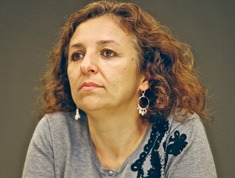
Greetings,
As 2011 draws to a close, we look back on the work we did this year—both our own and that of our member organizations—with a feeling of accomplishment and excitement about what the future holds. We are also grateful for the support of our members, our generous sponsors and donors, our volunteers, and many others who have helped make this year successful. Some highlights from 2011:
- Policy events stressed the importance of foreign aid. Two events this year–one featuring Representative Adam Smith and several leading nonprofit advocates and one a conversation with USAID Administrator Rajiv Shah–helped inform our local global development community and increase advocacy around development-related foreign policy.
- Over 350 convened at our 3rd Annual Conference. This years’ conference focused on “Opportunities and Obstacles in Turbulent Times” and included a wide array of speakers and thought leaders from the business, nonprofit, and philanthropic sector.
- Spotlight on global education. Global Washington brought together educators, policymakers, nonprofit leaders, and other stakeholders from across the state to form the Global Education Initiative. Its focus is to develop recommendations for creating a shared K-20 education strategy for the state of Washington. Over 150 of these stakeholders came together in person at Seattle University for a day-long summit to discuss this topic and finalize recommendations.
- Increasing awareness on Global Action Day. The mayor of Seattle proclaimed November 1st, 2011 as Global Action Day—a day to celebrate the achievements of Washington’s development sector. To celebrate Global Action Day, Global Washington, with the help of several member organizations, launched an extensive public relations campaign to increase public awareness about global development work.
- Community engagement in our ongoing programming. Global Washington convened numerous smaller events and workshops this year. These workshops explored a range of topics from microfinance, to working in Latin America, to utilizing social media in a nonprofit setting.
- New member resources. We were pleased to launch several new web resources for our members and the broader community, including a map and directory of Washington’s global development organizations, an online career center, and a member giving platform.
We will soon announce our plan for Global Washington’s work in the upcoming year—we hope that you are ready to take part in more exciting events and initiatives!
We could not have achieved any of our work without your support, attendance at our events, and most importantly, your care and concern for making the world a better place for all of us to live. We thank you for being a part of our community in 2011 and we look forward to continued collaboration in 2012.
In unity,

Bookda Gheisar, Executive Director
Back to Top
Featured Organization
Global Visionaries: Building Tomorrow’s Leaders
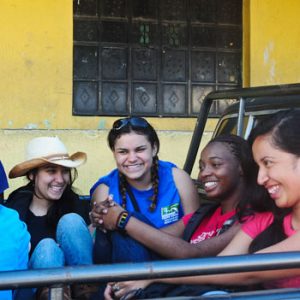 Take teenagers from south Seattle or Mercer Island to observe garbage sorting at a dump in Guatemala to learn about subsistence living, and you might just change their lives. Such has been the case for participants of Global Visionaries (GV), the Seattle-based program empowering youth to become active leaders and global citizens. It’s a program built from founder Christopher Fontana’s belief that today’s youth can be the leaders of today when given the opportunity. GV organizes both year-long and intensive programs, each culminating in a cultural immersion trip to Antigua, Guatemala. Key to the programs’ success is the socio-economic, racial and ethnic mix of participants, who learn from each other to face social biases and work together:
Take teenagers from south Seattle or Mercer Island to observe garbage sorting at a dump in Guatemala to learn about subsistence living, and you might just change their lives. Such has been the case for participants of Global Visionaries (GV), the Seattle-based program empowering youth to become active leaders and global citizens. It’s a program built from founder Christopher Fontana’s belief that today’s youth can be the leaders of today when given the opportunity. GV organizes both year-long and intensive programs, each culminating in a cultural immersion trip to Antigua, Guatemala. Key to the programs’ success is the socio-economic, racial and ethnic mix of participants, who learn from each other to face social biases and work together:
“As someone coming from the south end of Seattle, getting to know other kids from Mercer Island along with my other Cleveland High School peers was a powerful thing. Stereotypes are destroyed and I think we are all better for it.”
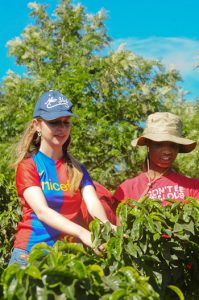 Global Visionaries pushes the youth to confront their comfort zones, tackle challenging social issues, fundraise for their trips and continue to apply the lessons learned for years to come. And it works. Another participant’s observation:
Global Visionaries pushes the youth to confront their comfort zones, tackle challenging social issues, fundraise for their trips and continue to apply the lessons learned for years to come. And it works. Another participant’s observation:
“ I was once an oblivious teenager unaware of what was really happening in the world around me, but since being a part of Global Visionaries I am dedicated not only to being aware of what is going on in the world, but dedicating my life to helping people and making whatever difference I can.”
Some students continue their involvement, serving on the youth board, or volunteering for longer in Guatemala. Last year, GV surveyed 526 alumni to find out how the programs impacted their life experiences and choices made post high school. The results from the 40% that responded are impressive:
- More likely or much more likely to take on leadership positions: 84%
- Agree or strongly agree GV made them more likely to advocate for social justice: 90%
- More likely or much more likely to reduce their ecological footprint: 82%
- More likely or much more likely to participate in community service or volunteer work: 87%
Seattle International Foundation provided Global Visionaries its initial funding, and now as a more established organization, GV is attracting more corporate and foundation support. For example, 110 Consulting, a Bellevue-based technology and business consulting firm picked GV to be their philanthropic partner. Still the organization is quite grassroots, running on volunteer and internship power to manage the myriad programs and leadership classes.
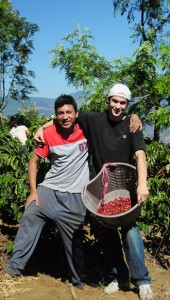 Fontana sees today’s youth as much more capable than they are given credit for. “The single most effective reform that we can make in education is to get out of the way of the youth,” he opines. “If we simply give youth ownership over their own education [they’d be] fired up about their education. There wouldn’t be any apathy.”
Fontana sees today’s youth as much more capable than they are given credit for. “The single most effective reform that we can make in education is to get out of the way of the youth,” he opines. “If we simply give youth ownership over their own education [they’d be] fired up about their education. There wouldn’t be any apathy.”
At the recent Global Washington Summit on Global Education, Treshawn Jackson, a senior at Chief Sealth High School in West Seattle, looked over the audience of educators and administrators and gave them a challenge: “How can you, as the powerful people that you are, make teaching more comfortable with students. Students need to feel more confident in the classroom.” Treshawn is enrolled in the Global Leadership (GL) class, another program of Global Visionaries, that focusing on peer-to-peer learning and service learning while building students’ leadership abilities and awareness in social and environmental justice.
Innovative? Absolutely. Easy to do? “I’m not going to lie to you, it gets messy and at times frustrating,” stated Fontana, one of the masterminds behind the methodology and curriculum. “Everyone is responsible to teach one another and regularly takes on those tasks the traditional teacher does from the most perfunctory to the most sophisticated. “
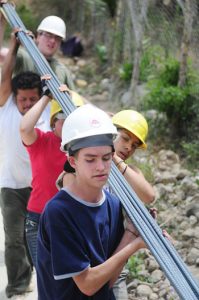 Hearing Treshawn’s testimonials about how engaged and involved all of the students are in class would inspire any educator to jump on board, and doing so does require, as Fontana put it, “high schools and teachers who will champion the class and who appreciate the innovate methodology that is required.”
Hearing Treshawn’s testimonials about how engaged and involved all of the students are in class would inspire any educator to jump on board, and doing so does require, as Fontana put it, “high schools and teachers who will champion the class and who appreciate the innovate methodology that is required.”
Global Visionaries will be bringing a new model of fundraising to the table, literally. On March 3rd, 2012, GV’s youth participants will be co-hosting dinners and leading dinner conversations, or “sobremesas” at restaurants throughout Seattle and other venues, including private homes. It will be a chance to meet others, learn about important issues and enjoy the energy that Global Visionaries inspires. If you’d like to cohost, Fontana encourages you to get in touch.
Any adult perplexed by today’s youth will enjoy hearing the stories of GV’s participants and how transformational the program has been. Simply put from one: “To be blunt, it changed my life.”
For more details on Christopher Fontana and Global Visionaries, please visit Global Washington’s December 2009 newsletter.
Back to Top
Changemaker
Ellen Taussig and the Art of Building a Universal Vision of Education
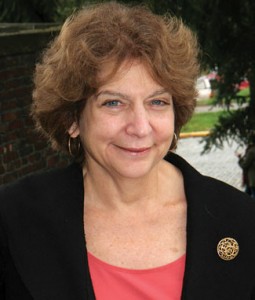 In 1955, Ellen’s parents took her to New York’s Museum of Modern Art to see The Family of Man photography exhibit. Those images and their honest portrayal of the human experience enchanted her. She spent long afternoons after the exhibit looking through her parents’ coffee-table copy of the book of photographs, and then bought a second copy just to cut out the pictures and hang them on her bedroom walls. One photo stood out: three young farm girls standing behind a fence, looking toward the viewer.
In 1955, Ellen’s parents took her to New York’s Museum of Modern Art to see The Family of Man photography exhibit. Those images and their honest portrayal of the human experience enchanted her. She spent long afternoons after the exhibit looking through her parents’ coffee-table copy of the book of photographs, and then bought a second copy just to cut out the pictures and hang them on her bedroom walls. One photo stood out: three young farm girls standing behind a fence, looking toward the viewer.
In the 1950s, the upper west side of Manhattan was a high-density melange of immigrant families of all incomes and nationalities. Taussig, daughter of German and Austrian immigrants, recalls how her parents had to learn to adapt to school schedules and give up their European-style large noontime meals. And she remembers listening to the Puerto Rican kids playing next door, to whom she credits her street-Spanish. In high school, she took the subway uptown through the projects of Harlem to the ethnically diverse High School of Music and Art (Taussig is a classically trained pianist).
Suffice it to say, Taussig grew up recognizing and participating in the universality of people. When asked what motivates her, Taussig is quick to point out the statistic developed by Harvard molecular biologist Walter Gilbert: people differ by only one tenth of one percent. Connecting with people beyond obvious barriers is one of Taussig’s core values and constant qualities.
While studying at Bennington College in Vermont, she worked at day-care centers in New York’s housing projects. “I remember seeing the drug store with half empty shelves and within ten minutes [back home] seeing stores overflowing.” This juxtaposition of poverty and affluence triggered her to action. She recalls that one day she said, “As long as this exists, I need to do something about changing it. I need to find a way to address it.” She had found her calling.
She moved to Los Angeles with her first husband, taught inner-city kids piano, and realized that teaching fit her work philosophy of find your work by what you are doing and whom you’re with. Your work has to be infused with your passion. At Yale’s MAT (Master of Arts in Teaching) program, Taussig prepared herself for a career as a public school teacher.
However, fate would have it that there were no job openings in the public schools, but there was one at a private school in North Hollywood. Taussig laughs, recalling the “crazy and wild time” she and the other teachers, with whom she created strong bonds, experienced at this school with links to the acting world. Taussig was 24 years old at the time, looked like a teenager, and was teaching kids 10 years younger. There was no set curriculum, nor did she have one developed. “What’s great about being in a wild and crazy place,” Taussig recalls, “is that it helps you sharpen what you believe in.”
So she did what any great educator does, she tapped in to what interests 14-year-olds and started her class with her favorite book when she was their age: The Family of Man.
Forty-two years later, the Humanities Program that she and her co-teachers developed at that school begins with a study of photographs from The Family of Man. (One writing exercise for those inspired is to look at that photo of the three girls at the fence and write an internal monologue from one of their perspectives.) The Humanities Program integrates what Taussig calls the five elements of society –religious, political, economic, social, artistic – and a strong global focus. “The global piece was always very important to us,” she states. One might think this all a bit too lofty for middle and high school students, but Taussig stipulates that “one of the things we believed in so strongly is to treat high school students with respect. Do not dumb down. They can understand these concepts.”
Taussig, her husband Paul Raymond, and Mark Terry took the program to Overlake School in Redmond, Washington and then began thinking about starting their own school. “When we looked around us, we couldn’t not start a school,” she explains. “We were so sure about what education could be and didn’t see it in public or private schools.”
They founded The Northwest School in 1980 as a private middle and high school. Some might find her transition from advocate of the underprivileged to founder of a prestigious private high school just a bit hypocritical. But her goal, always, she explains, is to advance what education can (and should) be—to develop an ideal situation with a richer connection between education and culture, informed by a background in civil rights. (Raymond, who had worked closely with Martin Luther King, Jr., registering voters, also started summer enrichment programs for inner city kids.) If founding a school was necessary to achieve this goal, that is what Taussig was going to do.
The connection between education and society’s culture fascinates Taussig, who opines that the U.S. lacks the cultural underpinnings that make education possible. “It’s too strenuous to parent and teach in this society when [you] have to deal with all of these fundamental things: what are the values, how you greet one another. This makes education so hard,” she states. “Everything you need to do, you have to do it because culture isn’t doing it.”
Taussig believes that schools themselves need to create a culture for the students to embrace. That starts with the principal, who needs to prioritize creating the culture that is right for the kids and then articulate and reinforce the vision. (Taussig has also served on the advisory board for the principal training program at UW Bothell, and hopes that the program will focus more on school culture development.)
Beyond schools’ need for culture, another topic that troubles Taussig is our current information overload. “We are inundated with too much that we don’t need to know and we don’t know enough of what we need to know.” She impresses that this imbalance of information affects the mood of the country. “People still know how to be joyful, have fun, celebrate. But we sit here and get overwhelmed with bad stuff.”
It’s hard to imagine Ellen Taussig overwhelmed with bad stuff. She exudes warmth and good humor, and the sparkle in her eyes is enough to get those around her smiling, if not ready to change the world. Her philosophies could be informed in part by growing up the daughter of Holocaust survivors. “Most people are good at heart and they want good. Circumstance can cause people to act in very evil ways. Humanity’s job is to help manage the circumstances.”
In June, 2011, Taussig stepped down as Head of School of The Northwest School and stepped up to the role of Executive Director of International Leadership Academy of Ethiopia (ILAE), slated to open in 2013. She joins the two founders, Haddis Tadesse and David Makonnen, in the creation a high-caliber academy in a country with a tradition of rote learning and only 30% of the population educated. It’s the perfect opportunity for Taussig to not only guide the development of programs built on discussion, critical thinking, leadership skills, and eventually virtual networking, but also to promote that philosophy of universalism that has been the essence of her work state-side.
Their strategy is to start small, keep it manageable and grow from there. That said, Taussig never puts limits on her visions. “If you start with a notion you find a way to do it. Put everything out that you want to do you and you find a way to do it. Every part of the vision.”
One standout component of the school is that it will eventually provide the ability for students to virtually network. There are certainly kinks to work through, but Taussig emphasizes the future of education and the impact technology can have. “Kids want to change the world. They feel they can because of social media. Through technology, kids are able to see that their activism can have result,” she explained at the recent Global Washington Summit on Global Education. “There’s no dichotomy anymore between education here or there.” Taussig marvels at how easily children can connect with one another across borders and across cultures. She thinks back to those photographs in The Family of Man, and how all of those children in the book had so few means to know one another or know of one another. It’s a whole new world now, where children can learn about and from one another and build on their universalism.
There’s another photo in The Family of Man that stays in Taussig’s mind: an indigenous piper playing a wooden flute. Taussig sees the universal thread that the flute has and the music that “joins people together.” Ellen Taussig –educator, Fulbright scholar, musician, Klingenstein Fellow, administrator, visionary, New Yorker, and lover of good bread – is one of Washington State’s pipers creating a more universal world.
Back to Top
Welcome New Members
Please welcome our newest Global Washington members. Take a moment to familiarize yourself with their work and think of opportunities for support and collaboration!
Infections Disease Research Institute: IDRI is a Seattle-based not-for-profit committed to applying innovative science to the research and development of products to prevent, detect and treat infectious diseases of poverty. By integrating capabilities, we strive to create an efficient pathway to bring scientific innovation from the lab to the people who need it most. http://www.idri.org/
Mangrove Action Project: Partnering with mangrove forest communities, grassroots NGOs, researchers and local governments to conserve and restore mangrove forests and related coastal ecosystems, while promoting community-based, sustainable management of coastal resources. www.mangroveactionproject.org
Bill & Pat Bali Fund: We are simply a couple of relatively normal people living in Edmonds, WA (about 15 miles north of Seattle) who found a need in Bali and felt called to do what we could to assist these children break the cycle of poverty into which they were born. http://www.balifund.org/
Richter International Consulting: Dave Richter has been living and working in the international arena most of his life. He has lived as an expat in Africa and in Asia (on three occasions). He has managed 24-hour medical assistance operations in Asia and the Americas, and is fluent in Mandarin. This experience provides Richter International Consulting with the practical hands-on knowledge needed to solve the complex problems which are inherent to international assignments. http://www.richterintl.com/
Global Impact: Global Impact provides organizations and donors with effective ways to give to causes, regions and crises throughout the world. We deliver a wide range of giving solutions through an alliance of globally focused charities, management of two of the world’s largest workplace giving campaigns and partnerships to meet the needs of organizations and donors. http://www.charity.org/
Back to Top
Announcements
Seattle U And LDI Conference To Discuss Law And Development At The Microlevel
The Seattle University School of Law and the Law and Development Institute will hold their 2011 Law and Development Institute Conference: “Law and Development at the Microlevel: From Microtrade to Current Issues in Law and Development” on December 10, 2011, at Seattle University.
Seventeen leading speakers from seven countries will present the latest ideas and proposals on how the new form of international trade, such as microtrade, may assist poorest countries and peoples around the world to escape from worst poverty, how development finance and investment may contribute to their economic improvement, and how the international community may assist least-developed countries to resolve some of the most serious issues causing their economic and social hardships. The conference attendants may have opportunities for questions and discussions after panel presentations.
Visit the website to see conference schedule, speakers’ biographical information, and presentation summaries. On-line registration for the December 10th 2011 conference is required. For additional information about the conference, please contact Junsen A. Ohno, International Programs Administrator, at ohnoj@seattleu.edu or 206.398.4283. Questions regarding the Law and Development Institute should be directed to Professor Steve Lee at info@lawanddevelopment.net.
Global Health Nexus’ Be The Change Competition: A Great Opportunity For Students
The “Be the Change” competition, sponsored by Global Health Nexus, is an opportunity for teams of high school, community college, and undergraduate students in Washington State to create solutions, awareness, and innovation in global health, using technology, social media, the arts, and more. Participants compete for cash awards, great prizes, and public recognition from the Gates Foundation and leaders from other high-profile organizations in our state.
Interested? Act fast: the initial submission date is approaching – December 15!
For more information, resources and application forms go to Global Health Nexus at http://globalhealthnexus.org/competition/or contact info@globalhealthnexus.org. Global Health Nexus, an initiative of the Washington Global Health Alliance, raises public awareness and creates partnerships to spur innovations and accelerate the growth of our region’s global health sector.
Co-Founder And Program Director Of Heal Africa, Lyn Lusi, Receives 2011 Opus Prize
Lyn Lusi of HEAL Africa (Health, Education, Action, Leadership Africa) accepted the coveted Opus Prize at an awards ceremony held on November 2nd at Loyola Marymount University. Lusi has dedicated the last 40 years of her life to her work in Africa, beginning in 1971 as a teacher in Zaire, then continuing her work with various development organizations in Nairobi, Kenya, and Rwanda, before returning to the newly formed Democratic Republic of the Congo. Lusi and her husband Dr. Kasereka (“Jo”) Lusi founded HEAL Africa in 2000 with the commitment to eradicate poor health, poverty and oppression of women in the DRC. HEAL Africa runs a full-service training hospital in Goma and provides community-based initiatives in public health, community development and conflict resolution.
The Opus Prize is an annual faith-based humanitarian award given to unsung heroes of any faith throughout the world. Winners of the award receive $1 million to advance their work and outreach.
Global Alliance To Prevent Prematurity And Stillbirth (Gapps) Announces New Initiative For Scientists And Researchers
In partnership with Bill & Melinda Gates Foundation, Seattle Children’s GAPPS proudly launches their Preventing Preterm Birth Initiative as part of the Grand Challenge in Global Health. Grants will be awarded to scientists and researchers to discover the causes and mechanisms of preterm birth, the leading cause of infant mortality in the world. To learn more about the Request for Proposal and guidelines, visit the website. LOIs must be submitted by January 31, 2012.
Seattle University Professor Announces New Health And Social Welfare Blog
Ruth White, Associate Professor for Anthropology, Sociology, and Social Work, Global African Studies at Seattle University has started a blog called “Provoking Policy,” exploring local and global policies related to health and social welfare. The blog can be found at www.provokingpolicy.blogspot.com
Women in Innovation Summit: Launch Party This week
A launch event for the 2012 “Women in Innovation Summit—Women of the Next Fifty” will take place on December 1st in Bellevue from 6:00PM to 8:00pm. Come hear the current plans, join the conversation and help make this summit relevant. Who are women thought leaders, drivers and practitioners of innovative approaches in the areas of leadership, technology and science, in education and social change? What do women innovate? How do women innovate? What is your and your organization’s role in this?
6:00 PM to 8:00 PM
The Summit Executive Conference Center
10885 NE 4th St, Ste 100, Bellevue,WA 98004
For more information visit: http://www.womenoffifty.com/event/wof-website-launch-party/
Community Screening of American Teacher
On December 12th at 6:00pm there will be a community screening of American Teacher, a new documentary about teaching in the United States.This documentary is directed by Academy Award-winner Vanessa Roth and narrated by Matt Damon. It depicts what it is like to be a teacher in America by following four educators at different points in their careers. The screening will take place at Town Hall Seattle, 1119 8th Avenue, Seattle, 98101. The DVD will not be available until next year, so this is a special opportunity to see this film! There will be a discussion after the screening with producer Ninive Calegari, Lauren Woodman and Anthony Salcito from Microsoft Corporation, and a local education expert. The discussion will be facilitated by Warren Etheredge, founder of The Warren Report and the host of The High Bar.
For more information or to register, visit: http://townhallseattle.org/%E2%80%98american-teacher%E2%80%99-film-screening-and-discussion/
Contributors: Megan Boucher, Carolyn Hubbard, Bookda Gheisar
Back to Top
Third Global Washington Happy Hour event: an intimate and thoughtful conversation with KJ Zunigha, Special Projects Coordinator, Corporate Services at PATH.
Posted on November 14, 2011.
Global Washington organized its third Global Happy Hour on October 13th. A group of Young professionals got together to talk about global health issues and career opportunities within the global development sector. Our guest speaker KJ Zunigha, Special Projects Coordinator, Corporate Services at PATH, gave insightful advice and led a thoughtful discussion.
- Here are the top 10 tips that KJ discussed that can help energize your research:
1. Join the next PATH Community Coffee to meet with staff members, recruiters from HR team and learn about PATH’s role in improving health and well-being in communities around the world. The next Community Coffee is Thursday, December 8, 2011 from 8-9 am. Email Molly Haas at events@path.org to RSVP for the event!
2. Be persistent, keep applying! Despite possible rejections you may have received in the past, don’t hesitate; keep applying for different positions at your favorite organizations.
3. Find a mentor, (a teacher, a co-worker etc.), who can advocate for you. You don’t have to go the road alone, find someone who already has an “in” to advocate on your behalf. People love to mentor. Chances are they have had some great mentors in their careers and would feel honored to mentor a passionate young professional like you!
4. Network, Network, Network. Networking can happen anywhere at any time. Not only are there more formal networking events available for young professionals, but some of the best networking can occur when you strike up a conversation with someone at a global development talk, conference, happy hour, or your favorite Peruvian restaurant. You never know when a casual conversation over your shared love of pisco sours will land you an interview at a great organization! Don’t be shy, network away!
5. Participate in informational interviews with different staff members from an organization that you like. Through informational interviews you can discover what skills you still need to improve and how to make it in a given industry.
6. Volunteer in the sector you are interested in. Even if you haven’t landed your dream job yet, you can still gain valuable skills. This will give you some field experience and will help you realize what career opportunities exist within your desired sector.
7. Believe in your potential. Don’t feel discouraged by typical job requirements such as, “5 years experiences required”. Through a short experience abroad, internships, volunteer or extra-professional activities, in addition to your past job experiences, you have accumulated valuable experience and transferable skills!
8. Keep learning. If you just graduated, stay in touch by reading blogs and articles related to the fields you like. If you are in a work transition period, go online and gather as much information as you can. You have to show that you are passionate about the field you want to work in. Showing recruiters that you are well informed increases your credibility.
9. Be creative. If you have a great idea, share it with your peers; look for collaborators or people who have the same interests as you. (e.g. participate in global social enterprises competition like GESEC).
10. Be positive and RELAX. Your dream job might be right around the corner, so don’t give up and keep looking!
Global Washington’s happy hour events are once a month in different places in downtown Seattle (restaurants, café). Each time, a global issue will be covered and a young professional (A Global Washington member organization) will be invited to share his/her experience and provide information on challenges, opportunities and trends in the field of global development work. Come join the dynamic and energetic conversation with inspiring young professionals. There is a lot to learn from each other! The Global Happy Hour event is a great and fun way to network and get useful tips to advance young professionals’ carrier in global development.
Global Washington Raises Awareness Of Global Health And Development Work
Posted on November 9, 2011.
Mayor McGinn proclaimed Monday Nov 1 “Global Action Day” in the City of Seattle, to raise awareness of the size and impact of the global health and development sector in Seattle and Washington State. This day coincided with Global Washington’s 3rd Annual Conference, “Opportunities and Obstacles in Turbulent Times”. Mayor McGinn provided opening remarks at the event.
Continue Reading
The Modest Heroine Of The 2011 Opus Prize: Lyn Lusi
Posted on November 8, 2011.
As Lyn Lusi accepted the $1 million Opus Prize on Wednesday night at Loyola Marymount University in Los Angeles, she threw down a gauntlet. Churches must take on the challenge of changing relationships between men and women, everywhere in the world.
Two centuries ago William Wilberforce, a lifelong social activist, goaded churches in England to rethink the ancient assumptions that allowed people who saw themselves as virtuous and religious to accept slavery as “normal.” They did not respond immediately, but over time norms and teachings changed. Supporting slavery today in a church setting would be unthinkable. But churches today are sometimes, but by no means always, the leaders in society’s efforts to bring social justice. And there are serious gaps on today’s central challenge for justice: equality between women and men. Thus churches today must look inside their communities and what they teach and preach, so that they can lead with a new understanding of what justice and equality mean. That will mean changing ancient norms that have allowed women to be treated as somehow inferior to men.
Lyn Lusi works (with her beloved husband, Dr. Kasereka Jo Lusi), in Goma, which sits at the very heart of Africa in the east of the Democratic Republic of the Congo. They co-founded HEAL Africa and it is her passion and her project: H stands for health; their hospital deals with many health problems, but far too many address the results of the violence of that region, including patching up the many women and young girls who have been raped. E stands for education, connoting the deep sense that knowledge and understanding are truly at the heart of a healthy society and justice. A stands for action; in Goma no one from outside can or will step in to act, so it is up to those on the spot to bring about change. Which comes to the L in HEAL, which stands for leadership, an ideal whose essence is to use one’s gifts for good.
Lyn’s is an inspirational life story. As a young teacher she came with the Baptist church to the Congo (as it was then known; today, it is the Democratic Republic of the Congo and in-between it was known as Zaire). Contrary to what she initially expected or desired, she fell in love with a Congolese doctor and moved to Africa, where she has lived ever since. Quietly, with a deep faith in God’s guidance and ever conscious of the crying needs of people suffering from what must be the world’s most brutal war, Lyn and her husband work together to build both a hub for action and a model and example of what a person can do. From a tiny clinic they have built a busy center that reaches out both to heal bodies and souls and to rebuild shattered communities in the region with microcredit and other support.
It was this remarkable work that earned Lyn the Opus Prize. Given annually, the Opus Prize recognizes unsung heroes from any faith tradition, anywhere in the world, who are working to solve today’s most persistent social problems. The $1 million prize is awarded alongside two $100,000 awards and they represent collectively one of the world’s largest faith-based, humanitarian awards for social innovation. (Full disclosure: I serve on the board of the Opus Prize Foundation).
Lyn speaks of hope and finds good in all the people she works with. If Africa is seen solely through the lens of conflict and evil, she says, healing cannot happen. And HEAL Africa has demonstrated that miracles can and do happen, even with very scant resources. But Lyn fires up in anger when she recalls the horrors that women face and how little support they receive even from those who should be their ardent defenders.
As she accepted the Opus Prize, Lyn Lusi highlighted the vital role that churches play in communities in eastern DRC. Women’s and youth groups, pastors and the church communities themselves provide what amounts to the only services and social safety net available. They can be the real glue of the society. But she also told a sobering story. After a promising workshop at a church where several congregations came together for discussion and training, she received a letter from the church leaders thanking HEAL Africa for its support and endorsing the workshop’s conclusions.
The church leaders, however, had one objection. They did not agree that women who were raped should NOT be excommunicated. In short, the attitude that women invite, even deserve rape extended so deeply into the church communities and leadership that they could not even see their way to compassion and support. Where women should be able to find comfort, consolation, and support instead they met rejection and blame.
The story points to the crying need for deep reflection and change within Christian communities. And Lyn Lusi is thrilled that the Opus prize resources will allow her to work for that goal. More power to her!
The Modest Heroine Of The 2011 Opus Prize: Lyn Lusi
The Huffington Post | Katherine Marshall | November 8, 2011











